An Interview with Tanya Saracho
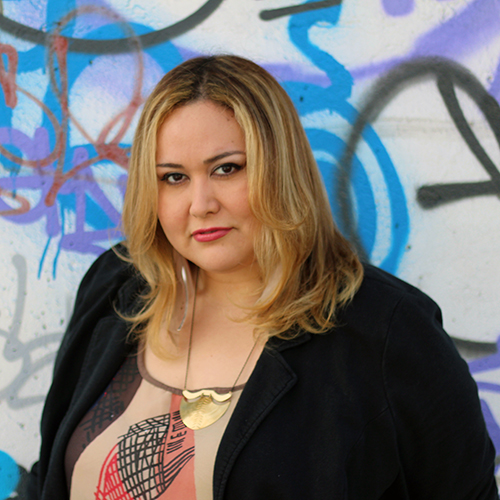
Written by Victoria Myers
Photography by Martina Szarek
October 29th, 2014
“You should talk to Tanya Saracho. She’s really smart about gender and race issues.” Luckily, we decided to take this advice and interview playwright Tanya Saracho. And, yes, she is really smart about gender and race issues, and lots of other issues affecting writers in today’s world (want to know what it’s like to be a playwright working in TV? Read on… and then follow her on Twitter). This summer you may have caught Tanya’s play Mala Hierba at Second Stage Uptown, or Hushabye as part of Steppenwolf’s First Look. Tanya’s work has been seen at the Oregon Shakespeare Festival, Clubbed Thumb, The Goodman Theatre, and Teatro Luna, the Latina theatre company she founded and was artistic director of for ten years. On TV, she has written for Devious Maids and Girls, and is currently a writer on HBO’s Looking. And last, but certainly not least, she’s a member of The Kilroys. It’s really no wonder that she has a lot to say on many issues from Latina playwrights to the relationship between Outlander blogs and the future of theatre. Okay, we’re not going to give any more of our conversation away, so read on to see what she has to say.
(i.) Present
You’ve been working a lot in TV lately. How do you think that’s affected your playwriting?
It has affected it. Anyone who tells you it doesn’t is lying or some kind of genius. When you start working in TV, you are a writer for hire and you have to serve one person’s vision—usually the showrunner or the network—so there’s a lot of pressure to get it right. This show, Looking, that I’m on right now, has a very specific aesthetic. Last year, when I was working on The Tenth Muse—a seventeenth century new Spanish play that takes place in Mexico before Mexico was Mexico, and it was all-female, all nuns, it’s in a convent—and then coming back to Looking, which is young gay boys in San Francisco, was jarring. It was like whiplash. And it started affecting my theatre writing. Usually I have a specific way I do stage directions, but in TV you have to be so strict and detailed, but nothing flowery, which is not how I write theatre stuff. But I started noticing I couldn’t even write the stage directions how I used to do it when I was just doing theatre. Then it became the scenes—like in theatre I’d write long scenes—the scenes started getting shorter. It just started affecting it. So for me it has been jarring, because I haven’t stopped doing theatre the entire time I’ve been doing TV, which has been a little over two years now.
(ii.) Engagement
One of the things that is interesting about TV is how intimately people engage with it. They get really invested.
This morning I was looking up Outlander blogs because I’m obsessed with Outlander in that fangirl way. And it’s strange and a little embarrassing, and my writers’ room has told me to stop talking about Outlander. And I think fifteen or ten, or maybe even five years ago, we wouldn’t have had access the same way we do today. Like twitter. Most writers’ rooms have a 24-hour twitter account. So you follow other writers. And the producers tweet and the stars tweet. It’s such a strange time. I walk down the street with the boys from my TV show, and people think that they know them, and it’s not just from the show that they watch. TV has become this interactive experience—you’re a consumer of television and you consume the brand and everything that comes with it. People who want to be writers on TV are following me on Twitter and asking me stuff. It’s such a strange time with the social media element.
We love that stuff. I follow a lot of Downton Abbey blogs. How do you think that type of engagement might transfer to theatre?
Well, we have to figure out who is watching theatre these days. I’m from Chicago, so I’m very Chicago-centric, but if you’re going to talk about New York it’s very cost prohibited. So, you have to figure out what percentage of the population is watching theatre, and then there’s a conversation about class. I’m very aware of being a Mexican, being Latina, and being a woman, and looking out and seeing if the audience looks like me. And also age wise. TV is interactive, you can watch it whenever you want, you can be in your sweats, and it’s the way we live now—we consume storytelling in a very specific way, and all of these platforms are catering to how we consume. Like are you binge-watcher? Because Netflix has figured out that we like to binge-watch. So theatre is appointment events; you have to show up at a certain time, you have to be quiet, and you have to turn off your devices. And I think there’s a generation of theatregoers that aren’t giving it a chance, you know? And if you’re going to the theatre and the theatre doesn’t look like you, it’s problematic, because how do you engage with it? Like, “I just spent $60 to watch a two hour play that has nothing to do with me.” Some companies are moving this conversation forward since they’re doing shows that are modern and inclusive. But I think it’s a real problem. Who is the theatre for? Who are these price points for?
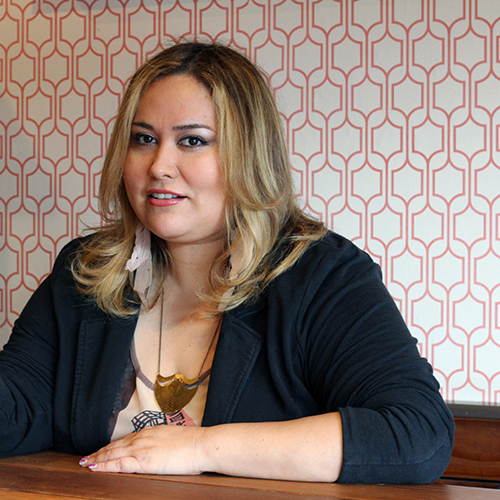
(iii.) Process
What would you say are the themes in your writing?
Obviously I’m obsessed with women and Latina women. I think I’m on my seventh or eighth all-Latina play. I’m really comfortable in that world. So, if I had to say what I’m interested in exploring, it’s that—class, and how it affects Latinas and people of color.
What inspires you to start a play? Do you get inspired by visual images? Or characters?
So, I’m caught right now in this machine of commissions, so I’m going to answer that two ways: pre-commissions and post-. And pre- the commissions, I was doing theatre out of necessity, because I had Teatro Luna, a Latina theatre company I founded and worked with for a decade, and what we wrote came out of a need to express ourselves and start a dialogue. It was necessary and a little raw, but I’m so proud of that stuff. The stuff I’m writing now is assignments. It’s because it’s due. I’m in a place with my writing where I’m trying to figure out how to keep my voice and do these commissions.
Have you found a way to navigate that?
I haven’t. 2010 is when everything started coming, and then two years later is when TV came. When I was at Teatro Luna, even if it was mostly me writing it, I felt supported. Then, when I went off on my own and did that regional theatre thing where you go off, meet people, have a reading, and then you leave and it’s like, “What happened? What was that about?” It’s like a gypsy thing, where you get dropped in and have to connect in three days. I never quite figured that out. I’m very much about people and collaboration. It becomes artificial, you know? I feel like my work started to suffer. Although, it also got stronger, since if you really want to tell a story it has to be told a little more masterfully. But then TV started. So for the past two and a half years I’ve had to navigate working a fulltime job.
(iv.) Past
What was the first piece of storytelling that had a major impact on you?
When I was three or four I was the Virgin of Guadalupe in Church. I was dressed as the Virgin in the chapel and I had to recite a monologue. We have a very specific mythology of the Virgin of Guadalupe—she appears to an indigenous kid, Juan Diego, and he changes the world. So I was saying “Juan Diego! Juan Diego!” and every night I would practice it with my mother, and she choreographed it and I knew the movements. Well, when the day came, I went up there and I started, and then I froze and started again and froze—and this is how my mother tells the story—and everyone started laughing because I was being a clown about it. And my mother stood up and started screaming across the church, “Stop! Stop!” and was hysterical and yelling at everyone. And I remember seeing my mother and being fueled by that, and then delivering the monologue—the power of laughter and the fact that it’s live and can go wrong, and how it affected the audience and my mother. I was hooked. To me, it felt like I had control over the whole church. I do remember being up there and feeling like, “I have power.”
Who were your heroes growing up?
Oh my god. I am obsessed with Juana Inés de la Cruz. So much so that I ended up writing this play [The Tenth Muse]. I have so much respect for who she was. She’s one of my biggest inspirations. My big muse. She was a seventeenth century nun. Some say she was the first writer of the Americas, a long time before there was a North America. And she was a feminist. I think she was queer—she wrote these amazing love poems to women and she was in a convent, so you do the math. And she was just a badass. She was a genius. She taught herself twelve languages. She taught herself Latin when she was a kid and she would cut her hair if she didn’t get it right. She was a child genius, but the thing was she happened to be a woman at a time when that wasn’t a desirable thing. She’s my big hero.
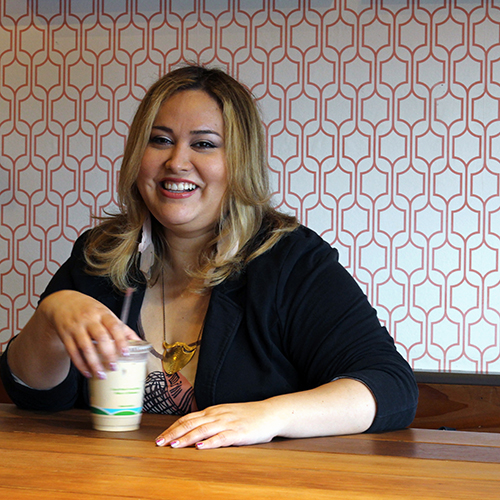
(v.) Places
You were born in Mexico and raised in the region between Texas and Mexico. That’s a place with a certain amount of mythology attached to it. Do you think that affected your creative development?
The border is a notion too. It’s a mood. It’s a culture. I went to Boston University, after living seven years on the border, and I really was speaking in two tongues—I was dual person back then. My parents are divorced, and my father’s house was on the Mexican side, and my mother’s house was on the US side. And sometimes, my mother only liked to buy groceries in Mexico because that’s what we were used to, so she would go to Mexico. It was always living in duality—not an either/or, but both at the same time. I didn’t realize until I got up to Boston how that had seeped into me. All of my writing—the first plays that I wrote at school—they all took place on the border. And now still. The play [Mala Hierba] in New York this summer was a border play. I sold a play to HBO and we’re developing it into a series, and that’s a border play. I think it’s an unexplored space, and only the inhabitants know how it is. People have an idea of it, that it’s like a dust and frontier type place, but it’s so different. It’s import/export. It’s an entry point to the United States—a lot of stuff you might be wearing now might have come through where I’m from. It’s a really rich area of material for plays.
And then you lived in Chicago. Did that influence your artistic development?
Chicago is home. I chose her and she chose me. My heart is there. It’s just perfect. It’s a metropolis, but the people are kind. The food is delicious. The theatre is divine and rich—and the community and the way we take care of our own. People go, “Why don’t you just live in LA?” I pay for two lives and I’m paying rent. I should probably just let it go, but I can’t because of the people and the community. So that’s the other place that ends up in my writing. It’s a place that I know more as an adult, in a way. The border is my parent’s border too. I go to visit them. It’s like my childhood. But Chicago is very much adult me. So those two places have really influenced me.
(vi.) Racism
When was the first moment you felt like a grown up?
The first night that we moved into my apartment into Chicago—it was me and my college roommate—we moved into this apartment that I’m still currently living in. We were on the stairs, and the people upstairs had a porch. We were on the stairs just contemplating the neighborhood and like, “This is where we live! We’re such grownups!” That moment of, “College is done and the real world begins!” And then these two girls from upstairs, who were white, came out and were so friendly and they offered us lemonade that they’d made. We were like, “This building is going to be awesome!” And then one of the girls starts breaking down the neighborhood and she’s like, “Just be careful if you walk over there because there are some black people.” She whispered, “black people,” and all of a sudden, you become very aware of who you are. Then she goes, “And over there is okay—there’s just some Mexicans live down there.” And then she was like, “Oh sorry. Are you…” and this pause is something I’ll never forget, “…Mexican?” Like she was saying “a cunt”—like an awful word she didn’t want to say. And I was like, “Yes, I’m Mexican.” And she was like “Oh, the other kind of Mexican.” And that has stayed with me. It was like a big slap: Hello, Chicago. I love Chicago, but it is a racist city. And the racism lies not in the primary colors of it, but it lies in the corners in little exchanges like that. I was so shaken by it. Like what, to her, is the other kind of Mexican and why should I not walk over there? So that was a slap in the face. We were idealist and then that.
It’s interesting how racism manifests itself in different parts of the country.
Yeah, and she tried to give me a compliment by saying, “Oh the other kind.” What does that mean? I know what that means, but what did it mean to her? It was hard, but it changed a lot of my writing. A lot of my Teatro Luna writing was based on that exchange.
(vii.) Perception
As you mentioned, you founded Teatro Luna, which is a Latina theatre company. One of the things people have discussed with us is the perception that stories by women or people of color are niche. What do you think about that?
Well, that theatre company is now a different thing, but I’ll speak about my time at Teatro Luna. It’s okay to be a niche. We formed to be that and we formed in reaction—it was a reactionary thing. I had shown up to Chicago and I started as an actor, and all the auditions I would get were for maids or prostitutes. It was just so many maids with one line. So it was reactionary—it was like, “Is this it?” It was 2001. There was the Latin explosion that was happening in the early 2000s with Ricky Martin and Jennifer Lopez, and we can laugh at the ridiculousness of what became the pop culture version of her, but she changed the landscape. She opened a lot of doors because she didn’t always play Latinas. She got people used to her playing a non-Latina character—it wasn’t about identity. We formed because we wanted a safe space where we wouldn’t have to play the maids or, if we were playing the maids, we were talking about it in a really complicated manner. So niche can be good. It’s an aesthetic as well as an identity—at TL it didn’t just help us, it made us. Then later on… when you start being invited as a token or start living in the American theatre as a token it does get exhausting. But when it comes to the work, I think it’s okay to have niches and identity-based things. I don’t find anything wrong with it. You want a space where you can have power and agency. And all of us, when we showed up, had been told that women are not funny and that Latinas who do theatre are like hookers—we came with cultural stuff from all sides—and when you get in there, if you have a good safe space, all of that goes away. So, in a way, I like it for building work. Now when it’s how you’re perceived, that can be problematic since it’s about other people’s perceptions, and that’s why you created a theatre company in the first place. So it’s a complicated thing. I know why I’m invited to some of these programs—a lot of them like my work, but I can go down the list of the programming that I’ve been part of and it’s all because I’m a person of color right now. I’m grateful and it’s also complicated.
Does it also feel like more pressure?
Totally. I don’t mind representing my culture, but it’s so much pressure. And sometimes you feel like you can’t just write a play, it has to have all of these elements that people expect from you. I’m interested in class and Latina women, but when it’s, “We need a Latina thing,” it’s like, “Oh, shoot.” Or just when you walk into a space and you feel like a token at some of these theatres, you know? And you have to be okay with that.
(viii.) Representation
One of the problems with under-representation is that it seems like the writers who do get shows produced are asked to represent a lot of people to make up for the deficit. But that can be at odds with what makes for good writing. What do you think about that?
You know, I take it on. I think people get that vibe from me and it’s okay. I have a lot of Latino friends who are working in TV now, and they’re playwrights and they don’t write identity plays. They never have. They don’t want to. It’s not of interest to them. But people expect them to because their last name ends with a Z or an A. Or they’re Cuban and now they have to represent all Cubans. And I hate that for them. Now obviously, I have an interest in my culture—in my little tiny niche in Mexico and my specific Mexico too. It’s like if they asked you to represent all America and you’d be like, “Which America?” But, yes, I think that’s so problematic. But that’s also why a lot of us have gotten our foot in the door. When it becomes problematic is when you can only be seen that way. Strangely, I feel TV is more advanced that way than theatre is. [In theatre] all the programming that has brought me on, like commissions, is related to me being Latina. I’m super grateful and I love the programs. In TV, I came in through the ABC Diversity program, and then my next job I got just because of my writing, and it’s not a Latino themed show. It’s going faster. I think there’s so much money involved in TV that you have to prove yourself, and if it doesn’t work, you’re out of there. Your identity is not going to keep you there. Something about the theatre is taking longer to incorporate these stories of color and these points of view into their mainstage seasons. I don’t know why. You go in there and you either become embittered by the tokenism or you embrace it and you say, “Listen, this is the way I got in but it doesn’t mean it’s the way you stay in.” So it’s complicated.
How do you think the theatre community can better talk about diversity?
The producers are the gatekeepers and making decisions for their companies; not just in outreach, but it has to start with what your audience and staff look like. It has to look like how you want your theatre to look. Like who’s in charge? Who is picking the plays? Who is putting their money where their mouth is? More women, more people of color. But to me that’s simple math. But that’s the thing that you can’t get around. It’s like it has to be organic or it’s not going to work, and it can’t be just “this initiative” or “this programming.” It has to be organic and it has to be a true interest.
Who are the top five Latina writers that you wish would get produced more?
1. Migdalia Cruz
2. Cherrie Moraga
3. Milcha Sanchez-Scott
4. María Irene Fornés
5. Elaine Romero
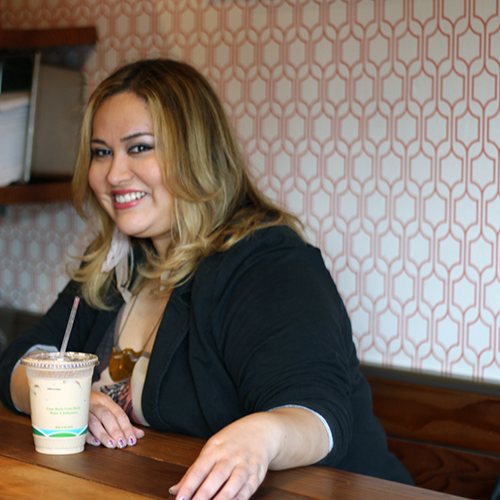
(ix.) Kilroys
You’re a member of The Kilroys. We know you’re planning on doing another list.
A list, among other things.
What else are you planning?
The strength of that list was that you weren’t expecting it and then it came, so we have a bunch of stuff in the works like that, but I can’t talk about it. It’s all in the same realm of shining a light on this issue, but in a more modern, contemporary, irreverent way. But I can’t tell you the actual things we’re planning. We’re still talking. It all takes seven to nine months. Even the list. We just had the meeting to plan it out. So we are going to commit to doing the list every year, but we also have some other stuff just to hang a lantern on this issue in our way. Sometimes when you read statistics or do a bunch of panels it doesn’t always have an effect, so we’re trying to effect change. There are a bunch of really smart ladies in the group who are really good at that. I love those ladies. They’re so smart. I just love us and what we’re doing.
We’ve talked to other people about how there’s a bias in the media when covering these issues. Did you have any experiences like that?
Well, yes, but we also had a ton of support. So we had those reactions, but then we also had a lot of support from allies and other women. And we learned a lot too, about terminology and agency. We used twitter a lot; #ParityRaid was our hashtag, so we learned a lot about how to use that. But yeah, we had some unfortunate reactions. But I really do think some of it landed, since so many artistic directors asked for those plays, which the literary managers had already read but they hadn’t gotten to the artistic directors. When The New York Times writes about you, it becomes real. I can’t wait for the list next year. It’s going to be a whole new list.
Why was it important for you personally to get involved?
I have no other choice. I don’t know how else to put it. I sometimes feel voiceless in these spaces, so I know about lots of voices that aren’t heard. And I’m not just talking about the American theatre; I’m talking about as a woman in the world. It’s just organic. I’m interested in women’s voices, and if I can help amplify that… it’s not a very eloquent answer, it just is.
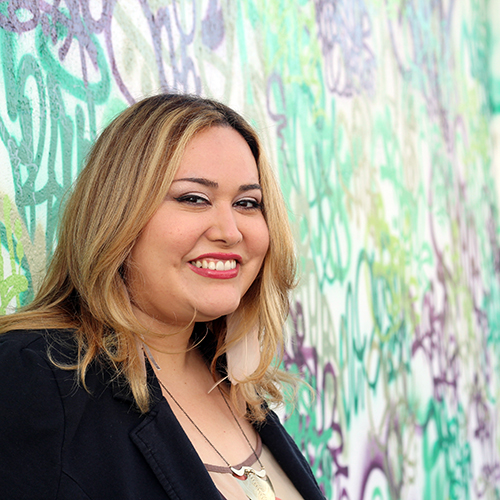
(x.) Future
What’s something you think people can do to improve gender parity in theatre?
I’m going to get really specific. Right now, if you tried to give a list of ten Latina writers who are getting produced around the county, you could not. So I just need Latina writers to keep writing. A lot are giving up. It’s like a double-whammy. We have to keep writing. We need a canon of work. And yes, it’s tough, but we have to keep writing those stories. My main thing is for Latina women. I know Latinas who are writing, but they’re not getting produced, and that’s a tragedy. So we need to keep writing because our stories are worth it.
You can follow Tanya on Twitter: @TanyaSaracho and Instagram: @TanyaSaracho .
